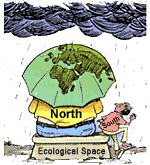A few weeks back, I was at attending a symposium on climate change, sustainability and equity in Hyderabad, organized by reputed institutions, and attended by prominent figures in academia and civil society. The symposium was informative and lively, consisting of numerous presentations on subjects ranging from climate change and gender to the future of ‘the protocol’. One topic that captured my attention was the issue of equity, and how climate change was creating inequity not only through its far reaching impacts, but also how even mitigation efforts were turning out to be an inequitable undertaking for the majority of the worlds’ population. It is clear that the 36 Annex 1 countries of the UNFCCC, with their energy intensive lifestyles and their relentless but inequitable pursuit of progress have been responsible for the vast majority of emissions. Through this indiscriminate and inconsiderate pathway of development, they have created and reinforced inequity time and again.
Developing countries now have a very small window of opportunity for following this unsustainable but demonstrated development pathway before we reach the crucial tipping point of 550 ppmv of CO2 equivalent, following which the magnitude and frequency of impacts would far outweigh opportunities for development. Meanwhile, wealthy Annex 1 countries are perpetrating further injustices on the poor of the world, and are arm-wringing India into submission and into committing to binding emissions reductions. Is this equity? Climate change will undoubtedly increase socio economic imbalances in society. Poorer segments of the population, especially those dependent on natural resource management such as farmers, livestock herders, fisher folk and other marginal communities would be most affected by the adverse impacts of climate change, while they themselves would have contributed very little to emissions. Even within a country like India, climate change is gradually revealing how inequitable the future will be. The section of the population which can afford air travel will also be the segment of the population which has an energy lifestyle comparable to the west, and is therefore most responsible for climate change.
this equity? Climate change will undoubtedly increase socio economic imbalances in society. Poorer segments of the population, especially those dependent on natural resource management such as farmers, livestock herders, fisher folk and other marginal communities would be most affected by the adverse impacts of climate change, while they themselves would have contributed very little to emissions. Even within a country like India, climate change is gradually revealing how inequitable the future will be. The section of the population which can afford air travel will also be the segment of the population which has an energy lifestyle comparable to the west, and is therefore most responsible for climate change.
Paradoxically, they are also the section which will be least impacted by climate change. Poorer people who can’t afford energy intensive lifestyles instead will have to face the brunt of climate change, and will be forced to adapt or perish. Is it equitable to ask these segments of the population to alter their lifestyles, which are already low carbon intensive, while they are going to suffer greatly because of no fault of theirs? It is crucial in future to maintain equity in society, and to protect those communities that are least equipped to adaptation to the impacts. Creating livelihood opportunities for vulnerable segments of the population who have been impacted, displaced and traumatized, and helping them during this period, would go a long way in preserving equitable development in our society.

